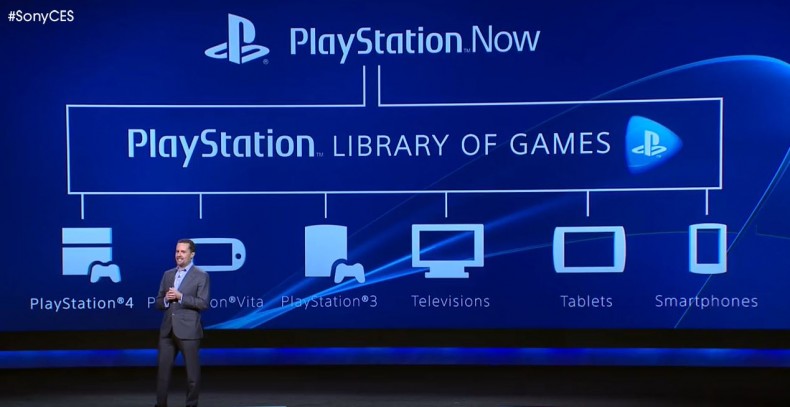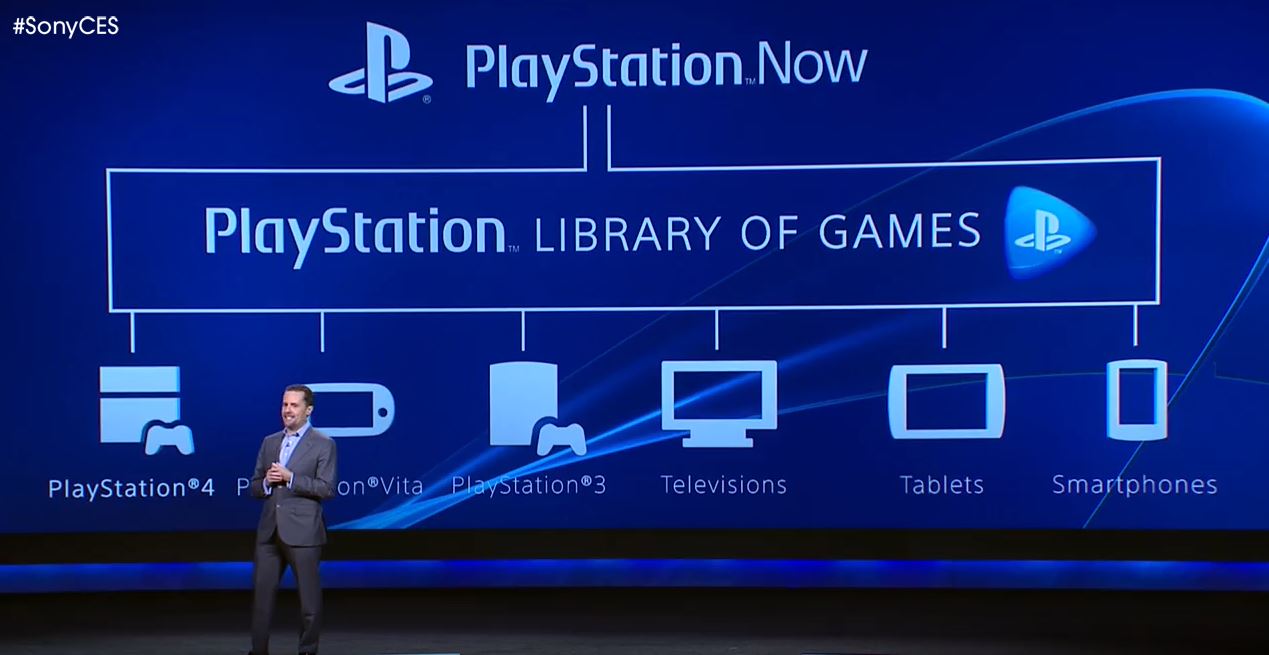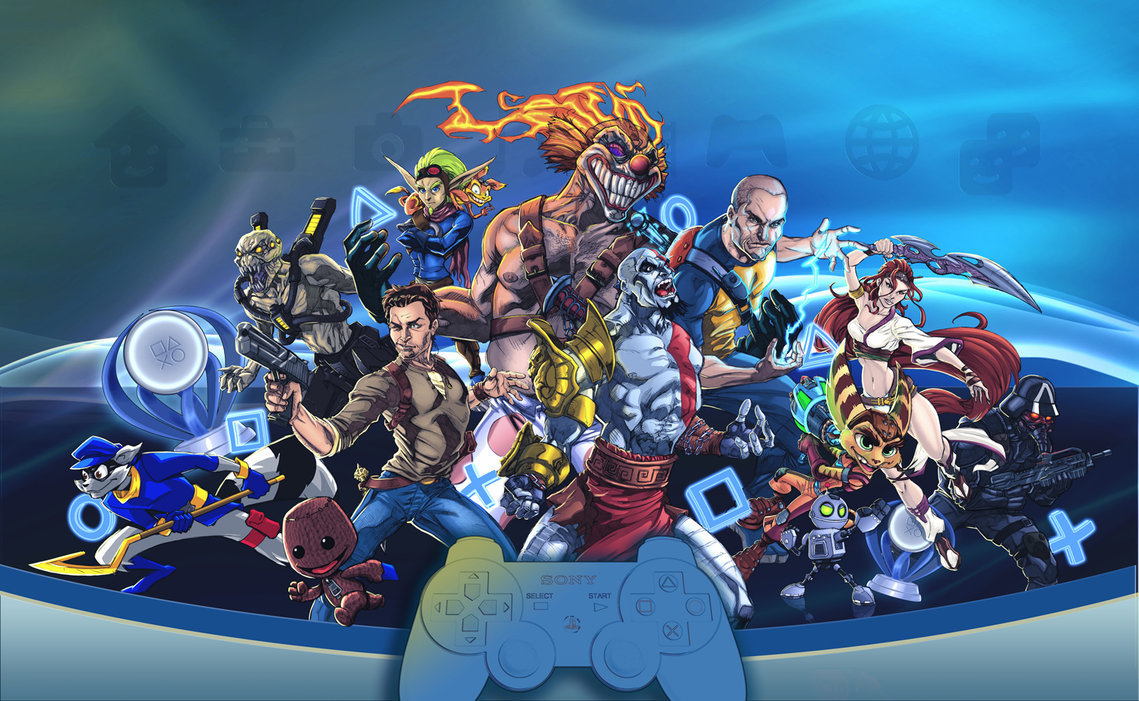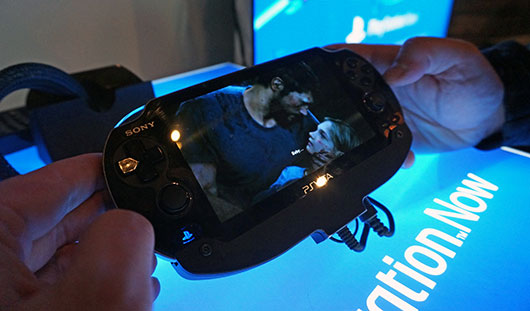Why PlayStation Now Is Important, and Why You Should Care


Sony Computer Entertainment President and Group CEO, Andrew House unveils PlayStation Now at CES.
Going in to a new console generation there is always a question that seems to come up without fail:
“Can I play my [insert previous generation console] games on it?”
As friends, co-workers, and family members asked me this question coming up to the release of the PS4 and Xbox One, my negative answer was always followed by a disappointed reaction. It’s definitely a justified reaction too. People see the looming release of new consoles as the death of the systems and games they play now.
With the lack of backward compatibility on the PS4 in mind, plus games like Lightning Returns and Persona 5 still on the way, I still have my PS3. With my PS4 and Xbox One not getting a huge amount of use yet, I’m still playing games on it pretty regularly.
So if I still have my PS3, why would I even be bringing up backwards compatibility in the first place?
Because one day, years down the road, I’m going to be feeling nostalgic and go to put my copy of The Last of Us into my PS3 to find that the system won’t even turn on.
Knowing that day is going to come scares the absolute shit out of me.
Short of my father’s old NES and my various handhelds, every system I’ve owned and didn’t sell has eventually gone and died on me. Whether it was two out of three of my 360s succumbing to the “Red Ring of Death” or my original PlayStation never getting past the start up screen, they all reached the same sad end one way or another.

PlayStation Now helps to ensure the preservation of decades of games that would eventually be lost in the transition to a new generation.
This is an inevitability and it’s resulted in a lot of games I have gathering dust over the years since I can’t go back and play them.
I look at my shelf of games and realize that a lot of old games I have there are likely never to be used again as the ability to use games from preceding systems is no longer a feature frequently built into consoles.
I see now that with each successive console release, I pretty much have to surrender those experiences that were landmarks in my game-playing life to a state of unplayability.
People want backwards compatibility not just because they’re not done playing old games when the new consoles come out, it’s because they don’t want to feel like they have to give up the past just to join in on the future.
Everyone who plays games and actually gives a damn about them cares about the games they grew up with, the ones that they played during hard times in their lives, the ones that they look back on and say “this was a milestone in my life as a gamer.”
To think that those games and moments we look back on as so formative and crucial to our lives are locked on systems that won’t work in 10 years sits very poorly with me.
I already have, and plan to get more tattoos based on the most important games of various points in my life. I currently have the Zanarkand Abes logo from Final Fantasy X/X-2 on my left forearm, have plans to get one representing the Mass Effect trilogy, and at some point very soon will get the words “Endure” and “Survive” on my arms from a quote in The Last of Us.
The thought that one day when I’m old and married with children, my son or daughter could come up to me and ask what those words mean, and I wouldn’t be able to show them this game (when they’re old enough to watch or play such a game, mind you) that was affective enough to drive me to put ink in my skin is a depressing thought.
Hell, the thought that the ink in my skin and the discs on my shelf are all I’ll ever have of these games once these consoles die is an even more depressing thought.
Video Games are really the only medium that has this problem. Producers of movies, books, and television shows all take great care to ensure their works are preserved and available for later generations.
Books aren’t based on a hardware that can break after years go by. Movies and TV shows are on DVDs and Blu-ray discs that manufacturers go out of their way to make sure can be viewed on new hardware, or at the very least get re-released on Blu-ray years down the line. Not to mention services like Netflix that have shows and movies from decades prior available at the press of a button.

The Last of Us being played on a PlayStation Vita using the streaming technology of PlayStation Now.
But then, as if on cue, as I’m having this nauseating epiphany, Sony formally announces their upcoming streaming service, PlayStation Now.
PlayStation Now may, in fact, be the most significant new feature going in to this generation.
In the past, gaming has done a lot to screw up the process of preserving its history. The lack of backward compatibility in consoles may be due to the realities of console manufacturing, as well as a desire to resell games through downloads and HD remasters. This is why digital libraries aren’t carrying over from generation to generation.
But PlayStation Now is something that, if successful, can transcend all these problems. If Now is something that catches on and is kept in future iterations of PlayStation, Sony may have found the best way to benefit financially in implementing the ability for players to play old games on new hardware.
By making the capability to play old games not native to the system itself, but a possibility through streaming, they are reducing the potential costs of manufacturing systems in a way that can run old games and bringing in the profits that a subscription service entails. This makes it the most economically feasible way for Sony to do this as it will cost them less in the long run and pay for itself overtime.
If it becomes a staple for PlayStation moving forward, Now could be featured on the PlayStation 5, 6, and beyond. Then we as consumers will always be able to go back and play the games that mattered to us decades prior. We won’t lose these treasured experiences when we transition to the next platform.
Children that are young now, and maybe plan to get into the industry later will be able to play games that shaped the industry, as opposed to having to simply take our words for it when we tell them how important they are.
Best of all, I’ll be able to go back and destroy the Reapers or experience Joel and Ellie’s journey across America when I’m ancient and every last seventh generation console has ceased to function.
Nintendo and Microsoft would be absolutely foolish to not adopt a similar service.
Last year when Sony presented this idea at the announcement of the PS4, I really just took away that it would be a way for friends of mine to play the games they missed out on if they didn’t have a PS3, but bought a PS4.
Now that I’ve marinated on it, I see that it is actually the first step toward something the medium truly needs to be focusing on: Long-term preservation.











